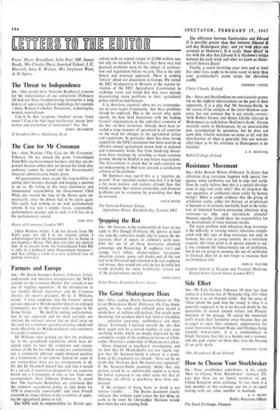Resistance Movement
SIR,—John Rowan Wilson (February 3) claims that infectious drug resistance happens with special fre- quency when antibiotics are fed to pigs and cattle. Does he really believe that this is a special develop- ment in pigs and cattle only? Has he forgotten the vast quantities of antibiotics taken orally by human beings? There is ample evidence that the giving of antibiotics orally, either for therapy or prophylaxis in humans or in animals, inevitably leads to the isola- tion of intestinal bacteria possessing infectious drug resistance—so why only incriminate animals? Humans, equally, should share the responsibility for the development of these resistant strains.
The main problem with infectious drug resistance is the difficulty in treating enteric infections compli- cated with this type of drug resistance, not only in humans, but also in young animals. As a veterinary surgeon, this latter point is of special interest to me. I, too, condemn the indiscriminate use of antibiotics, but if we are going to examine the use of antibiotics in livestock then let us not forget to examine their use in humans also.
JOHN R. WALTON London School of Hygiene and Tropical Medicine, Keppel Street, Gower Street, London WC1





























 Previous page
Previous page